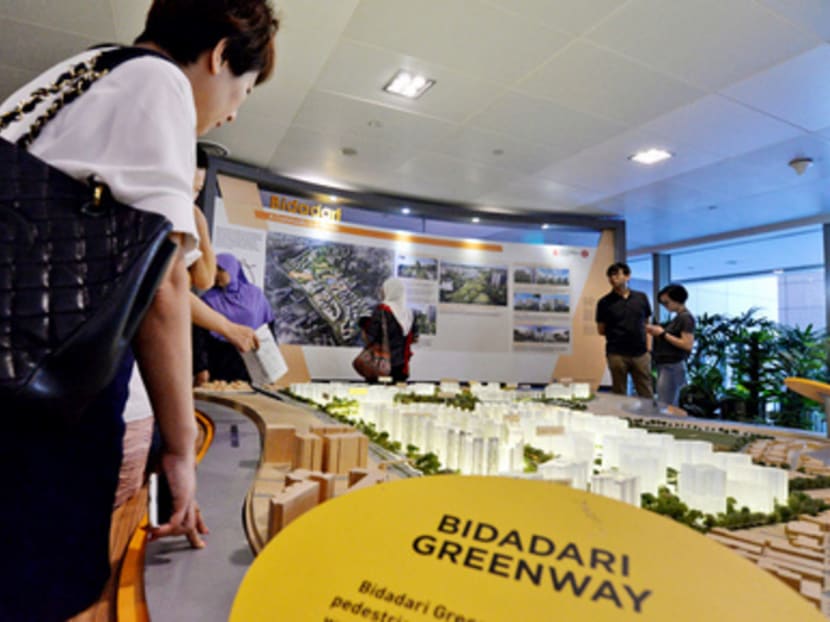Fears about past burial grounds soon laid to rest
Repurposing a burial ground is a good way to meet the angry souls of the dead, according to every horror movie. In Singapore, however, it is also a good way to raise land values, and the lost souls will not stand a ghost of a chance against real estate developers.

People looking at models of Build-To-Order flats at Bidadari. Although it is on the site of a former cemetery, a five-room flat there is priced as high as S$633,000. TODAY file photo
Repurposing a burial ground is a good way to meet the angry souls of the dead, according to every horror movie. In Singapore, however, it is also a good way to raise land values, and the lost souls will not stand a ghost of a chance against real estate developers.
A good way to describe property values is “80 per cent location, 20 per cent psychology”. There is no logical reason why burial grounds should affect residential housing — if anything, any residents there are probably the quietest neighbours around.
But logic has nothing to do with it. Recall the incident last year involving Fernvale Lea: After it was revealed that a temple to be built nearby would include a columbarium, furious would-be residents of the HDB flats insisted on refunds for their purchases.
The main reasons cited were traffic congestion and bad feng shui, which is another way of saying it is creepy and bad luck to live near the dead. Feng shui, which has a sizeable following, has always advised against having homes near burial grounds. Cemeteries are thought to be founts of yin energy, which in excessive amounts can cause lethargy and sickness.
Mysticism is not our strong suit at 99.co. But understanding buyers’ psychology is, and here is the kicker: Whether or not you believe in feng shui, it can sometimes affect the value of your home. Even if you do not believe it, that does not change the fact that future buyers or tenants of your property might. That is the problem with assets such as housing: Market sentiment is often a self-fulfilling prophecy. Some buyers will be put off by the idea of living near the dead.
The key question then is: How long does this factor affect property prices? The answer: Not too long.
VALUABLE PROPERTIES SIT ON FORMER CEMETERIES
Bishan initially suffered from the bad cemetery vibes in 1981, when Peck San Theng (the old name for Bishan) was exhumed to make way for housing. Today, properties such as Sky Habitat in Bishan fetch prices of around S$1,515 per sqf.
By 1985, a total of 21 cemeteries were cleared across the island, exhuming some 120,000 graves and assuring local ghost story writers of a lucrative future. Despite this huge number, most Singaporeans do not know how much of our city is built over former graves.
Dhoby Ghaut MRT Station, for example, sits on a former burial ground: It was a Jewish cemetery from 1841 to 1983. Takashimaya and ION Orchard both sit on exhumed gravesites, too. Prices in these areas are not the least bit affected by their burial ground history — median prices in the district are easily S$4,000 per sqf, even in this difficult market.
The Housing and Development Board’s Build-To-Order flats in Bidadari are also on the site of a former cemetery, but a five-room flat there is priced as high as S$633,000. This suggests that any impact cemeteries have on property prices is extremely short-lived. In the case of Bishan, a simple renaming was enough to wipe the memory of the cemetery from the collective consciousness in a few years.
In some cases, having graveyards in your backyard or in front of your home has no impact at all on its value.
A housing agent, who declined to be named, pointed to the example of Holland Close. Block 32 overlooks a Hakka cemetery with 3,000 graves, yet average transaction prices for three-room HDB flats rose from S$380,000 to almost S$400,000 between 2012 and 2014, even though you can see the graves right from the balcony, he noted. Prices have since fallen to an average of S$368,000 due to the weak property market in general. As in the case of Bidadari, it appears that for most of us, a 10-minute drive to town is worth the trouble of enduring haunting memories.
ABOUT THE AUTHOR:
Darius Cheung is CEO of property portal 99.co, which has raised funds from investors including Sequoia Capital and Facebook co-founder Eduardo Saverin.








